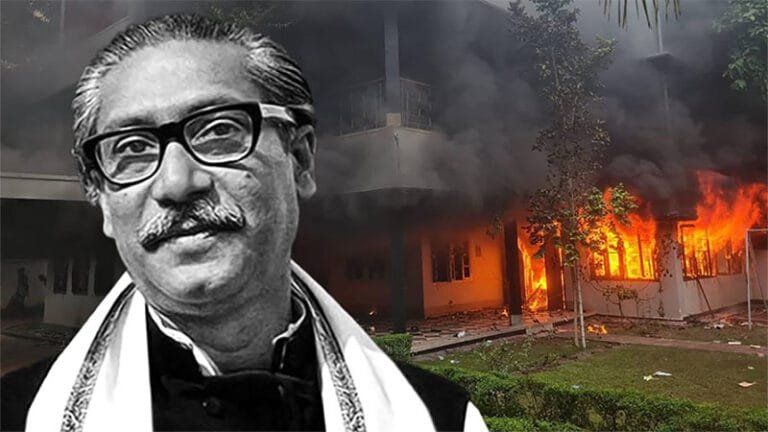"Dhaka Dhanmondi 32's Bangabandhu's residence - the living history of all the democratic struggles and battles of the Bengali nation, and after August 5, it is now nothing but a heap of ruins."
5 february 2025: The 23 years of history before the independence of Bangladesh, the history of the blood of the people of this land staining the streets. The birth of independent Bangladesh came after two decades of struggle against the oppression, injustice, and discrimination of the then West Pakistani military-civilian powers. Through the lifelong self-sacrifice of Sheikh Mujibur Rahman, the Father of the Nation, to secure the rights of the innocent, oppressed, and suffering people of Bengal, he became the undisputed leader of the Bengali nation. From the Six-Point Movement to the 1969 mass uprising, from the 1970 elections to the final victory on December 16, 1971—Bangabandhu’s selfless sacrifice, skillful leadership, and his towering love for the people of Bengal are the reasons why today we can call ourselves “Bangladeshis,” why we can write freely even after the genocidal massacre by Pakistani barbarians against the unarmed Bengalis in 1971. Today, Bangladesh stands in such a position on the world stage that global powers consider Bangladesh a key player in geopolitical calculations
"Dhaka Dhanmondi 32's Bangabandhu's residence - the living history of all the democratic struggles and battles of the Bengali nation, and after August 5, it is now nothing but a heap of ruins."
"Dhaka Dhanmondi -32's Bangabandhu's residence - the living history of all the democratic struggles and battles of the Bengali nation, and after August 5, it is now nothing but a heap of ruins." 5 february 2025: The 23 years of history before the independence of Bangladesh, the history of the blood of the people of this land staining the streets. The birth of independent Bangladesh came after two decades of struggle against the oppression, injustice, and discrimination of the then West Pakistani military-civilian powers. Through the lifelong self-sacrifice of Sheikh Mujibur Rahman, the Father of the Nation, to secure the rights of the innocent, oppressed, and suffering people of Bengal, he became the undisputed leader of the Bengali nation. From the Six-Point Movement to the 1969 mass uprising, from the 1970 elections to the final victory on December 16, 1971—Bangabandhu’s selfless sacrifice, skillful leadership, and his towering love for the people of Bengal are the reasons why today we can call ourselves “Bangladeshis,” why we can write freely even after the genocidal massacre by Pakistani barbarians against the unarmed Bengalis in 1971. Today, Bangladesh stands in such a position on the world stage that global powers consider Bangladesh a key player in geopolitical calculations.
Moreover, Bangladesh is emerging as the "tiger" of South Asia, standing tall on the world stage and rapidly moving forward on the path to self-reliance.
The history of all the democratic movements, struggles, and the life-long fight of the Bengali nation was centered around Dhaka's Dhanmondi 32, the residence of Bangabandhu Sheikh Mujibur Rahman—where he lived from October 1, 1961. From here, he led all the movements for Bangladesh’s liberation. On the historic 7th of March, he walked from this house to Racecourse Ground to deliver his iconic speech. Even in 1971, during the brutal Operation Clean Heart on March 25, Pakistani soldiers arrested Bangabandhu Sheikh Mujibur Rahman from this Dhanmondi residence. On August 15, 1975, he and his family were murdered by the bullets of assassins at this very residence.
In 1981, the house was transferred to Sheikh Hasina’s name, and she handed it over to the Bangabandhu Memorial Trust as a museum. The house remained preserved as the Bangabandhu Memorial Museum until August 5, 2024. During Bangabandhu's lifetime and after his death, many world leaders paid their respects at the Dhanmondi 32 Memorial Museum.
Then came the catastrophe: On August 5, Sheikh Hasina’s government, under pressure from student and public movements, fled to India, and that very day, much of Bangabandhu’s house was burned by the flames of student protests. What little remained of the memories was completely demolished by a bulldozer during the student protests six months later on February 5, when Sheikh Hasina delivered a speech to the students.
The only remaining memory of the birthplace of the leadership of the 1971 Liberation War, the freedom and independence of the Bengali nation, and the emotions and love of hundreds of millions of people—Bangabandhu Sheikh Mujibur Rahman’s residence at Dhanmondi 32—now lies in ruins. ✍️ Report Prepared By: Fozla Rabbi Robna










